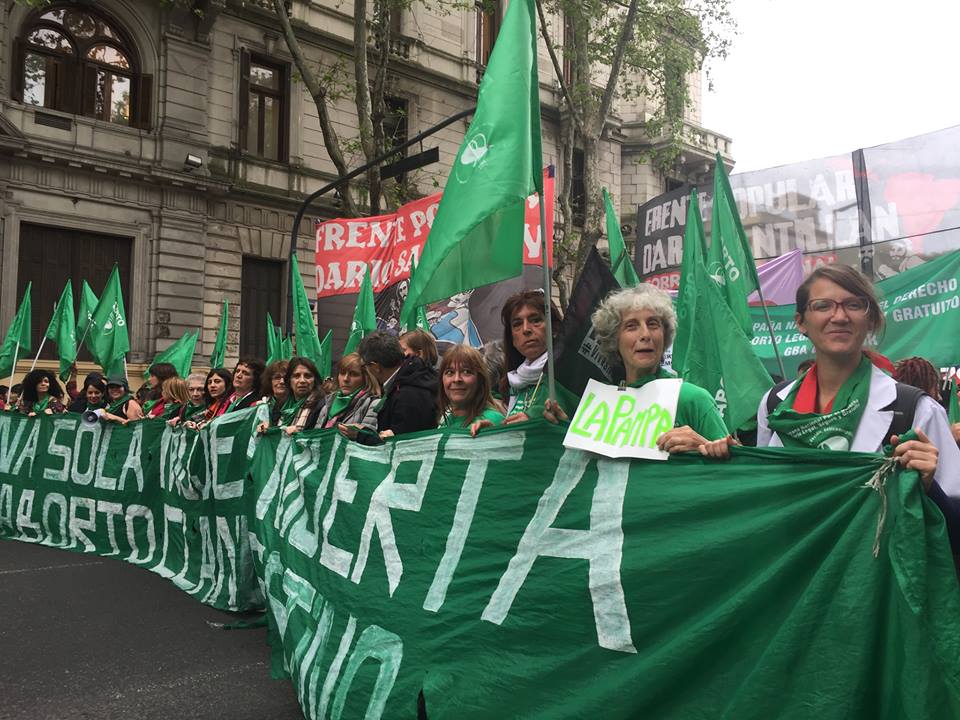The decriminalization and legalization of the Voluntary Interruption of Pregnancy (VIP) is a debt that democracy owes to people with the capacity to gestate (it must be remembered that, for example, transgender men can also abort). After years without a quorum to debate the bill, in 2018 it was finally debated. On June 8 of that year, in a marathonic day as we are accustomed to, the Chamber of Deputies (the lower house of the Argentine National Congress) gave it the long-awaited half-sanction. However, two months later, the Upper House turned its back on “the green tide”: that huge and unstoppable group of women and dissident identities that fought (and still fights) for the recognition of their rights.
On that rainy night in August, it was demonstrated once again that desire is still a problem. Despite this result, the recently deceased senator, Fernando “Pino” Solanas said in his speech that day: “Today is not a defeat, I tell the girls who are outside. It is a monumental triumph. We have managed to place the issue in the national debate.”
Two years later, the scene has changed: this time, the bill was entered by the Executive Branch, whose representative confirmed on more than one occasion that abortion should be legal, and that he would do everything in his power to make it so. He said it in the campaign, he repeated it at the opening of legislative sessions this year, and he reflected it by presenting a bill that would finally stop criminalizing the right of a pregnant person to decide about their body. As simple as that.
It is really necessary to make it clear that what is being debated these days in Congress is not only manifested in a transversal way and does not know partisan ideology, but also is far from being a personal choice: here the question is not “Abortion: yes or no?”. It is something much deeper: “Abortion: legal or clandestine?”
Everyday, and for reasons that exceed any type of analysis, people with the ability to gestate make the decision to end unwanted pregnancies. In the best case scenario, they pay very high fees to access an abortion performed by health personnel who do nothing but accuse them with one finger while receiving the money with the other hand. What happens in the worst cases? They die.
Why do they die? Because despair, poverty and helplessness do not know laws, and the methods are as diverse as dangerous: parsley, hanger, knitting needles, and more. You can google it, the information is just one click away. But not so the protection of those who cannot afford a safe way to do it. So yes: they die. Alone and in the dark. Underground.
This is why the problem of clandestine abortions is nothing else than a public health issue. Beyond personal decisions, it is essential that the government is present. If it becomes legal, will there be more abortions? The numbers will go up, of course; but because they can begin to be counted, and deaths will cease to be invisible. But something more important will happen: those who decide to abort will not give up their lives in the attempt.
What does the bill propose? Some essential points:
- The right of pregnant people to decide is enshrined: this includes access to information and comprehensive health coverage of the procedure (both in the public and private sphere) in case they decide to do so, which must be carried out within a maximum period of 10 days from their request. The Voluntary Interruption of Pregnancy, eventually, will be included in the minimum plan of medical benefits that must be covered by the health system.
- VIP is allowed up to the 14th week of gestation inclusive; after that moment, it will be enabled in cases of rape or in those that affect the health of the pregnant person.
- Regarding conscientious objection, it will be allowed as long as this decision is sustained in all areas in which the person who manifests it exercises their profession. As for health institutions, if they do not have professionals who carry out this procedure, they must immediately refer to another provider who does it, maintaining 100% economic coverage. This conscientious objection may not be used in order not to intervene in post-abortion health care.
- The government, in addition, has the obligation to promote compliance with Law number 26,150 on Comprehensive Sexual Education (sanctioned in 2006 and which has not yet been complied with in some provinces), establishing promotion policies that make it possible to strengthen the sexual and reproductive health of the population.
That said, I allow myself to reveal a little secret: I decided to only write the paragraph “of defeat” before the historic days of December 29 and 30, 2020. I didn’t want to feed illusions. The voting was too close to think of a different result than that of two years ago. From 4PM, speakers from different political parties presented their arguments in favor and against the voluntary interruption of pregnancy and the “law of 1000 days”; a successful initiative to accompany the desired pregnancies in vulnerable situations (because for your information, the VIP won’t force anyone to abort).
At 4AM, and with the speech of the anti-rights senator for the province of Formosa, José Mayans, the debate ended. Outside, the streets were divided between “light blue” and “green” scarves (the first one identifying those against the bill and the second for those who were in favor of it), who waited expectantly. Thousands of people also followed the process through the internet, social media and even through comrades who somehow transmitted what was happening.
The president of the Senate, Cristina Fernández de Kirchner, remained neutral and stoic (although it was known that she had supported the bill since 2018). The vote was closed and the numbers were surprising: 38 in favor, 29 against, and 1 abstention. The streets exploded in shouts and music: it is law.
The fight continues, and there is still much to do. For their part, the sectors in favor of clandestine abortion promise to challenge the law, and it is to be expected. They will not give up. But it’s 4 in the morning and as I hug my son, I celebrate that our country today is a little fairer.
Luciana Vidal is a feminist activist, lawyer, member of Centro de Estudios Legales y Sociales and Izquierda Unida Provincia de Buenos Aires.




